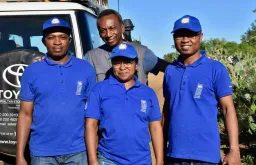Androy is the southernmost region of Madagascar, and one of the most vulnerable areas in the country. Since 2016, the United Nations Development Programme (UNDP) has stepped up its support to the Government of Madagascar in order to break the cycle of poverty, and benefits from the support of UN Volunteers to engage communities in recovery and resilience. Manitra Raoliarisoa is one of these UN Volunteers and shares her experience as a Local Support Specialist.
Isolation, war, famine, arid climate, poor access to basic social services, and lack of access to drinking water and electricity are common issues in Androy region. In the face of difficult external and environmental conditions, it has been challenging to recruit high-performing, skilled, and dedicated individuals to build a local team for the Androy region.
Nonetheless, Manitra Raoliarisoa did not hesitate to commit to serving as a UN Volunteer in Ambovombe, the administrative capital of the Androy region. Prior to this, she had also served as a Community Development Specialist in Mahitsy, a rural village located one hour from the country’s capital city. "For me, a volunteer is someone who wants to contribute to the development of his or her country and work with others who have the same objective," Manitra confides.
Five years ago, Manitra, along with her spouse and children, moved to Mahitsy for her assignment. They travelled by taxi-bus and had to ride along the southern axis of Madagascar for nearly 1,000 kilometres, over three to four days. As they made the treacherous journey, she clung to her motivation to deliver change in the southern region with her community development expertise.
We aim, in this project, to develop economic forces that will improve production capacity in the Androy region in a sustainable fashion. This includes promoting job opportunities, and therefore greater income, for vulnerable people. We aspire to improve living conditions by creating income-generating activities through community-based interventions. --Manitra Raoliarisoa, UN Volunteer Local Support Specialist
Other women volunteers started in Ambovombe simultaneoulsy with Manitra. However, it was not easy for everyone to adapt to the local context. Currently, Manitra is the valiant fille unique, or 'only daughter' of the UNDP field team in Androy.
Supporting communities in prioritizing their needs, accompanying them in implementing development interventions and contributing to the sustainability of ongoing activities – these are my primary responsibilities as a UN Volunteer specialist. It is exciting work, particularly when you begin to see the results. --Manitra Raoliarisoa
Manitra and her colleagues divide themselves between the different Ambovombe district sites to ensure proper training and technical supervision, strengthen capacity-building of producing households, and establish local development structures that maintain the sustainability of activities. Her team also implements a progressive approach to development. That is, communities not only benefit from the restoration of key infrastructure, but vulnerable households can also earn supplemental income through community works and a savings account that will help them start their next income-generating activities.
Changes have indeed taken place at the UNDP sites in the Ambovombe district, and Manitra is one of the architects of these achievements. "In my five years of service as a national UN Volunteer, it has been a great pleasure for me to work with a very dynamic team and a very special community with its unique culture and traditions," Manitra says.
The project’s accomplishments include two irrigated micro-perimeters which have been refurbished and can now irrigate 130 hectares of fertile land when the rainy season does not arrive too late. Two dirt roads that connect communities and are 20 and 12 kilometres long respectively have also been renovated. This allows local products to be sold and distributed more easily. Additionally, 50 hectares of sand dunes have been stabilized. A fodder production area, CACTUS, and a processing unit were built as well. Lastly, two castor oil processing units for cooperatives are beginning to become operational.
Manitra Raoliarisoa (left) and Marie Dimond (right), the UNDP Country Representative, during a community meeting for the renovation of the Bekopiky Ambovombe Androy dam. ©UNV, 2020
All of these endeavours have helped 5,406 individuals implement their income-generating activities. Another instance of capacity-building is the 170 local development committees that the project has created, with over a thousand members in total. The resulting two cooperatives will soon begin castor oil processing activities in order to increase the income of each member.
Most of the time, Manitra can be found in the communities, where she monitors their work and encourages ownership of the UNDP programmes to promote sustainability. She also passes on skills and knowledge related to operational management, from breeding to agriculture.
Our programmes are most successful when community members get involved voluntarily – without expectation of monetary compensation. In order to improve local development, it is essential that they apply the skills and tools we’ve shared with them, such as communication, a sense of leadership, simplified monitoring systems and management tools for their community projects. --Manitra Raoliarisoa
At the end of her term as a national UN Volunteer in Ambovombe, Manitra plans to continue to support community development in other parts of Madagascar, or where duty may call her in other countries.

